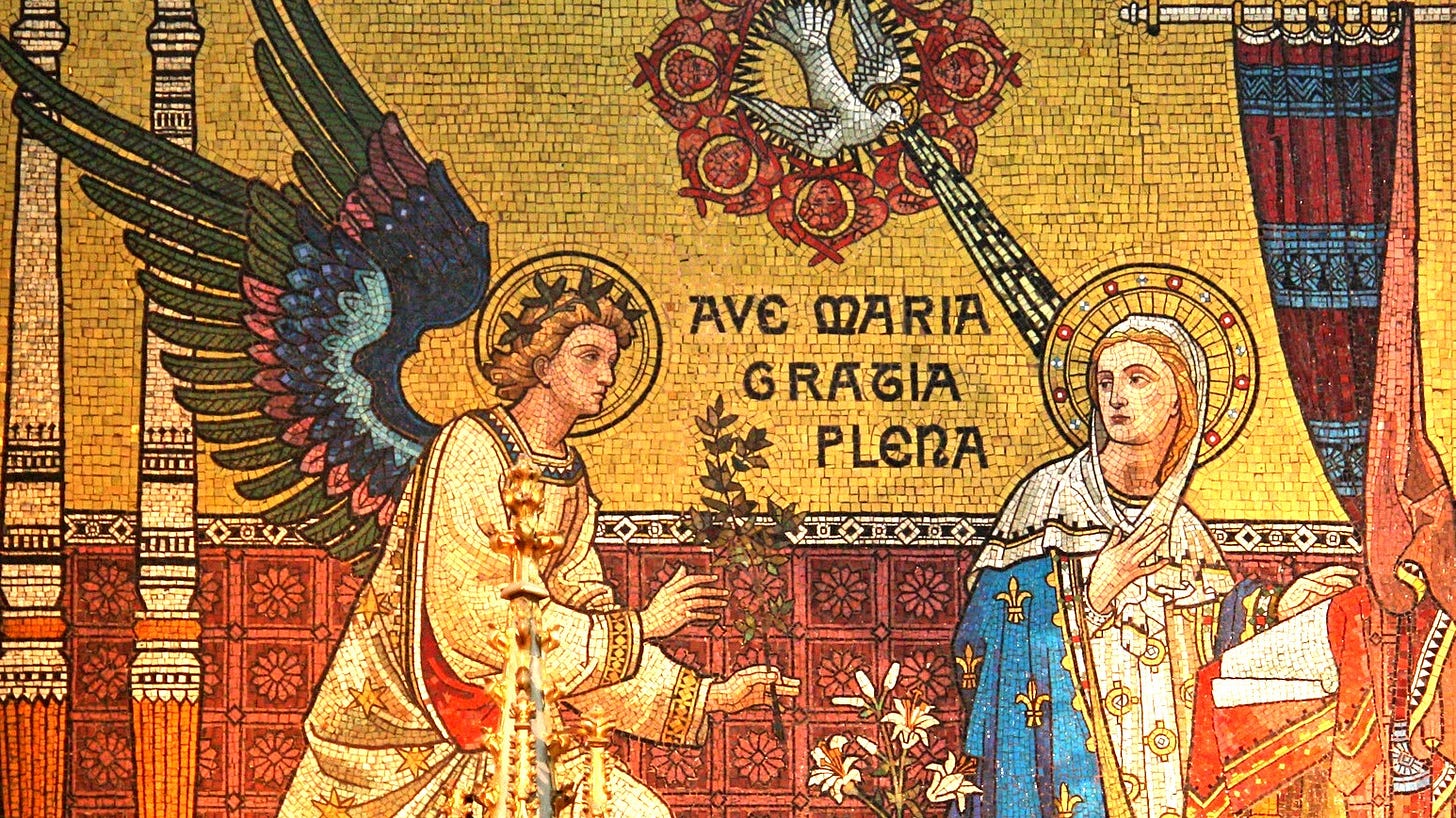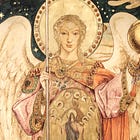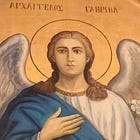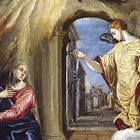How did Jesus respond when he first beheld his humanity in Our Lady's womb?
Christ accepted the burden of the Cross at the first moment of life.

Christ accepted the burden of the Cross at the first moment of life.
Editor’s Notes
In this piece, Fr Coleridge recounts a “dialogue” between the spiritual writer Fr Alvarez de Paz SJ (d. 1620) and Christ in the womb of his mother, at the first moment of his conception and assumption of a human nature.
This extract shows us…
How the Son of God, at the first instant of conception, knew, loved, and offered himself for mankind.
That the Incarnation was a gift of infinite love from each Person of the Blessed Trinity.
Why Christ was given his sacrificial mission from his first moment, and chose to suffer to redeem man and glorify the Father.
It shows us that the mystery of our redemption began with full knowledge, love, and consent.
It also points towards the teaching of Pope Pius XII in Mystici Corporis Christi:
[A]t the first moment of the Incarnation the Son of the Eternal Father adorned with the fullness of the Holy Spirit the human nature which was substantially united to Him, that it might be a fitting instrument of the Divinity in the sanguinary work of the Redemption […]
[T]he only-begotten Son of God embraced us in His infinite knowledge and undying love even before the world began. And that He might give a visible and exceedingly beautiful expression to this love, He assumed our nature in hypostatic union: hence—as Maximus of Turin with a certain unaffected simplicity remarks—"in Christ our own flesh loves us."
But the knowledge and love of our Divine Redeemer, of which we were the object from the first moment of His Incarnation, exceed all that the human intellect can hope to grasp. For hardly was He conceived in the womb of the Mother of God, when He began to enjoy the Beatific Vision, and in that vision all the members of His Mystical Body were continually and unceasingly present to Him, and He embraced them with His redeeming love.
O marvelous condescension of divine love for us! O inestimable dispensation of boundless charity! In the crib, on the Cross, in the unending glory of the Father, Christ has all the members of the Church present before Him and united to Him in a much clearer and more loving manner than that of a mother who clasps her child to her breast, or than that with which a man knows and loves himself.1
The Fiat of Mary
The Nine Months
Chapter VI
Burns and Oates, London, 1885
Headings and some line breaks added.
Departure of the Angel
“And the Angel departed from her.”
His work was done with the conclusion of his embassy and the consent of the Blessed Virgin, and it was fitting that she should be left alone with her God, that the work of the Incarnation might be wrought in her by Him. Much might be said about the execution of the Divine design, but it will be enough to give the few paragraphs in which the devout Alvarez de Paz draws up his contemplation in this great truth.
Alvarez de Paz’s Contemplation of the Incarnation
Having heard the answer of the Sacred Virgin, the Angel departed from her with joy, because he had received so happy an issue of his embassage, and wondering that he had heard from the tender girl before him words of so much humility and prudence. He departed at once, that he might set me a pattern of my conversation even with holy men. For as soon as my duty is discharged, I should at once return to my heaven in my cell, and appear before Thee, O my God, by Whom I had been sent forth. He indeed departed, but Thou didst not depart, O Thou God and Lord of Angels.
At the same moment Thou didst form, of the most pure blood of the Virgin, a human body perfect with all the distinctness of its organs, and Thou didst then create and join to that body a most perfect soul. And Thy Word assumed this body and soul, this humanity, to be His own, and raised it to His own personal subsistence, so that there was One Person alone in the Divine and in the Human nature. Thy Holy Spirit then endowed this Human nature with all graces and gifts, espoused it to Thy Word, and thus left accomplished this mystery, the work of consummate goodness, perfect and complete in all details.
Prayer to the Holy Trinity and to the Mother of God
O Most Loving Father, Thou didst rejoice now because Thou hadst given to us the greatest gift Thou couldest give, Thine own Son. Thou didst love Him, the Infant just conceived, infinitely more than all created things.
Thou didst rejoice, O Son of God most Wise, because Thou hadst made us partakers of such great benefits, and Thou didst love that humanity which Thou hadst taken to Thyself, never to lay it down again throughout all eternity.
And Thou didst rejoice, most Holy Spirit, because Thou hadst found the way for the remission of our sins and our justification, Thou hadst found Him Who was to redeem us.
And Thou also, most pure Virgin, for thou didst understand in an ineffable manner the mysteries which had taken place in thee, thou didst see thyself the Queen of Angels and the sovereign of all the world.
And I rejoice for all these joys thus combined, and because I find myself the son of the Father, and the brother of the Son, the dwelling place of the Holy Ghost, the poor client of the Virgin, and the companion of the Angels.
Conversation with Christ in the womb
And now I will speak with Thee, O Word of the Father, Son of God clothed with my flesh, the Messias and the Christ promised in the Law. I will speak with Thee, but before I congratulate Thee on Thy greatness, tell me, I beseech Thee, art Thou He that was to come, or do we look for another?
“I indeed am He that is to renew Jerusalem, I that speak justice and am thy protector to save thee.”
Tell me again, I beseech Thee, what did Thy blessed Soul see in Thee in that first moment of its creation, that I also may know Thee, and deal with Thee according to Thy worth?
“I saw that I was taken up into the Deity in unity of Person, and was so the true and natural Son of God. I saw that I was made the head of men and of Angels, appointed the King and Prince of all creation, free from any, even the slightest sin, which I could not possibly commit, surrounded by infinite grace and holiness and by all virtues and gifts connected with this mighty grace, endowed with knowledge of all things past, present and to come, with immense glory, the clear vision of God, with power to work all miracles, and for the remission of all sins.”
But why, O tender Child, is Thy robe red, why hast Thou a Body that can suffer, when according to the rights of Thy glorious Soul it ought to have been itself glorious, impassible and immortal?
“That I might give thee, O Man, an example of humility and patience, that I might suffer for thee, that I might make My Body a sacrifice and victim to be immolated for thee.”
His subjection to God the Father
I adore Thee then, my God and my Saviour, I bless Thee, I congratulate Thee, for all Thy gifts which I desire from my heart to be Thine, and offer myself to be Thy slave. And now show me, O Only Begotten Son of God, what didst Thou do when first Thou didst see Thyself to be so highly exalted?
“When I saw Myself in the womb of My Virgin Mother to be assumed to the Divinity, and adorned with gifts so ineffable, I loved My Father with a most ardent love, from Whom I had received benefits so great without any previous merits, I gave Him thanks with most burning affection. I humbled Myself most lowlily before Him, as one Who of Myself was nothing and had nothing. And then with the greatest readiness I offered Myself to serve Him.”
His mission of atonement, and his love for God and Man
And what then, O Infant Word of God, did Thy Eternal Father do?
“He showed Me the race of man altogether lost to the devil and subject to sin, He showed Me Himself injured and outraged by so many sins of men, and moved to indignation. He showed Me also the manifold afflictions, injuries, the stripes and wounds, and the death itself, which I was to undergo, and He commanded Me, as a mark of My gratitude, and as a service of obedience, to love men, to bear all these evils for them, and redeem them from the slavery of the devil.
“And then I looked upon you My brethren, and I embraced you with most ardent love. I was immensely grieved at the injuries done to My Father, I had compassion for you, and I made Myself subject to all those pains for the sake of redeeming your race, I took on Me the burthen of your redemption, and I said, O My God, I will it, and Thy law in the midst of My Heart.”
Therefore my most loving Redeemer, I give Thee immense thanks for taking on Thee this burthen, and I acknowledge that I have received from Thee all the good gifts which I have hitherto enjoyed, all that I now have, and all that I am to have hereafter. May I look to Thee not only as my deliverer, but also as my Teacher, and may I endeavour to learn from all Thy deeds and sufferings true virtue and purity of heart.2
Read Next:
Here’s why you should subscribe to The Father Coleridge Reader and share with others:
Fr Coleridge provides solid explanations of the entirety of the Gospel
His work is full of doctrine and piety, and is highly credible
He gives a clear trajectory of the life of Christ, its drama and all its stages—increasing our appreciation and admiration for the God-Man.
If more Catholics knew about works like Coleridge’s, then other works based on sentimentality and dubious private revelations would be much less attractive.
But sourcing and curating the texts, cleaning up scans, and editing them for online reading is a labour of love, and takes a lot of time.
Will you lend us a hand and hit subscribe?
Follow our projects on Twitter, YouTube and Telegram:
Pope Pius XII, Mystici Corporis Christi, nn. 31, 75.
Alv. de Paz, Vol. v. De materiis Orationis mentalis, liii. p. 2, med. 3.






